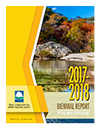Letter From the Commission
Below is the biennial report’s letter from the commissioners with the agency mission and philosophy. (Biennial Report to the 86th Legislature, FY2017-FY2018)
You will notice some changes in the signature line on this letter. At the end of FY 2018, Commissioner Emily Lindley was appointed by Governor Abbott to replace Toby Baker, who became the agency’s executive director. Governor Abbott selected Commissioner Jon Niermann to serve as chairman, in place of Bryan W. Shaw, who retired after nearly 10 years serving in that role.
The state of Texas is changing too. The population in metropolitan areas of the state continues to grow as new jobs are created and existing businesses expand. With such a booming economy, you would expect air quality to suffer. But the numbers tell a different story. Ozone levels, for example, have fallen by an average of 22 percent in Texas’s four largest major metropolitan areas since 2000.
Yet while the trendlines in air quality defy the growing economy and population, some challenges remain. And despite progress, ozone remains a persistent issue, particularly in the wake of tightening national standards. Unfortunately, in July, the EPA ill-advisedly designated Bexar County as an ozone non-attainment area, a designation it now shares with the Dallas-Fort Worth and Houston-Galveston-Brazoria areas.
Accordingly, the Texas Emissions Reduction Program remains as important as ever. The program is one of the very few tools Texas has to address mobile sources of nitrogen oxides, a precursor to the formation of ozone. TERP improves monitored air quality and helps guard against onerous and punitive regulatory measures that the EPA would more likely take in its absence.
Texas anticipates additional air quality benefits from the Volkswagen Mitigation Trust, created in settlement of claims against Volkswagen for its emissions fraud. Governor Abbott selected the TCEQ as the lead agency responsible for the administration of the approximately $209 million that the trust will make available for projects that reduce emissions of nitrogen oxides.
Not all change is welcome or positive, but good planning and cooperation can bring things back to normal. During this biennium, the name “Harvey” took on new meaning for Texans. We are proud of our employees and the agency’s response to this unprecedented hurricane and associated torrential rains and flooding that devastated many of the state’s coastal areas. Our emergency response teams worked before the storm to train and prepare ourselves, the regulated community, and the public. The agency provided information on a dedicated webpage, including forms and guidance on issuing a boil-water notice and other ways to prepare for disaster. After the storm, updates on public water and wastewater systems, debris management sites, and air monitoring results, just to name a few, were posted and frequently updated.
TCEQ responders also worked closely with state, federal and local partners from three unified command sites—Corpus Christi, Houston, and Beaumont—to mitigate environmental impacts. Just a few examples of activities include: assisting water and wastewater systems and getting inundated systems back up and running quickly, debris management, site assessment, tracking and managing recovery of orphaned barrels, and state Superfund site assessment. Many of our employees came to work to help others, even while they were dealing with personal loss at home.
The TCEQ stands ready to deal with future changes that will undoubtedly come our way and, as always, will apply standards fairly and use sound science to make decisions that are consistent with our mission to protect public health and the environment, while supporting a strong Texas economy.
Change is inevitable—managing change well is intentional.
Jon Niermann, Chairman
Emily Lindley, Commissioner
Agency Mission and Philosophy
Mission
The Texas Commission on Environmental Quality strives to protect our state’s public health and natural resources consistent with sustainable economic development. Our goal is clean air, clean water, and the safe management of waste.
Philosophy
To accomplish our mission, we will:
- base decisions on the law, common sense, sound science, and fiscal responsibility;
- ensure that regulations are necessary, effective, and current;
- apply regulations clearly and consistently;
- ensure consistent, just, and timely enforcement when environmental laws are violated;
- ensure meaningful public participation in the decision-making process;
- promote and foster voluntary compliance with environmental laws and provide flexibility in achieving environmental goals; and
- hire, develop, and retain a high-quality, diverse workforce.

